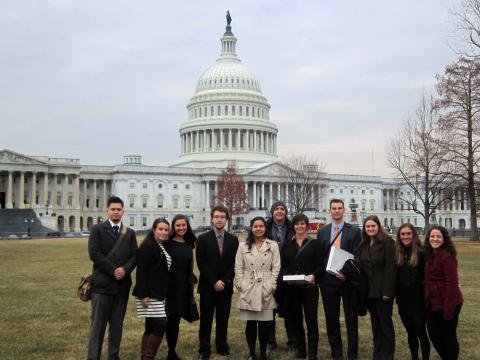MPA vs. MPP: How Are They Different?
For undergraduates and working professionals, understanding the distinct differences and similarities among public service master’s degree programs is essential. Perhaps the two most popular public service degrees – the Master in Public Policy and the Master of Public Administration – focus on preparing professionals to work in public service roles across different industries and career fields. However, the training that these programs offer students – and even the career roles that they prepare students for – can vary significantly. You can read about some of these differences and similarities below.
Masters in Public Policy
A Master’s of Public Policy degree program typically offers an academically rich and research-oriented approach to analyze, evaluate, and solve policy issues. Public policy refers to what "government (any public official who influences or determines public policy, including school officials, city council members, county supervisors, etc.) does or does not do about a problem that comes before them for consideration and possible action.”
Students engaging in a Master’s of Public Policy program generally train to contribute to the world of public policy by learning to evaluate and solve complex problems through the use of quantitative and qualitative data. These advanced skill sets are necessary for students to conquer the pressing issues that they are most interested in.
At Carsey:
The Master in Public Policy (MPP) program offers the opportunity to build the skills needed to succeed in today’s public policy careers, including analytical expertise, strategic vision, clear and compelling communications, and the tools of leadership. Choose from tracks focused on public policy analysis or strategy and communications and select from a broad range of electives designed to help personalize the degree.
Built into the unique curriculum are a variety of experiential learning opportunities to deepen and broaden what students learn in the classroom, such as:
- The Washington, D.C., Colloquium: Students become immersed in the capital scene – meeting with leaders in Congress, the White House, government agencies, political parties, advocacy groups, think tanks, and more.
- Policy Internship: Students work in a policy-focused organization to gain practical, real-world experience and a valuable perspective on careers in public policy.
- Capstone Project: Students employ the MPP skills they have gained to delve deeply into a specific policy area to produce a comprehensive written report and oral presentation.

The Carsey School offers a substantial amount of flexibility for students in its MPP program. The degree can be earned in as little as 14 months. University of New Hampshire (UNH) Juniors and Seniors can start taking 700-level undergraduate courses (which have 800-level equivalents) and begin working towards their graduate degrees upon hitting the 90-credit mark through Carsey's Accelerated Master's degree option.
Or, students can earn their MPP over a greater period of time by enrolling in the program on a part-time basis – providing an option for working professionals and those with families, as well as a more financially feasible path to a graduate degree. Academic courses are offered with a variety of evening, online, and in-person classes on the UNH Durham campus, with a portion of the experiential learning taking place offsite: Washington, D.C., for the Colloquium and at an internship site location during the MPP internship.
Requirements: Students enrolled in the Carsey School's Master in Public Policy program are required to complete a forty (40) credit program, consisting of:
- Five (5) CORE Curriculum Courses
- Four (4) EXPERIENTIAL LEARNING Activities
- Two (2) PUBLIC POLICY TRACK Courses (Strategy and Communication Track or Policy Analysis Track)
- Four (4) ELECTIVE Courses
Students also focus their public policy studies by choosing either the Strategy and Communication Track or the Policy Analysis Track and completing two courses in one of these tracks. Courses in both tracks can also be taken as open electives. Further opportunities for depth and specialization in substantive policy areas are provided by open elective courses that vary by semester.
As the program progresses, students apply what they've learned through an MPP internship at a policy-oriented organization and a capstone project aimed at delving deeply into a policy area of interest. Both of these experiences are provided with guidance from faculty mentors.
Masters of Public Administration
A Master’s of Public Administration (MPA) offers a broader approach and education into the policy world, with a goal of preparing students for careers in public service and nonprofits. More succinctly, “MPA programs develop the skills and techniques used by managers to implement policies, projects, and programs that resolve important problems within their organization and in society.”
At Carsey:
Carsey's online MPA teaches skills needed for public and nonprofit management, including leadership, program evaluation, budgeting, planning, personnel management, collective bargaining, and policy analysis. This flexible MPA curriculum is easily accessible online, enabling students to learn in a more asynchronous manner and apply what they learn to their local communities.
Carsey's MPA graduates are fully prepared to engage within their communities and organizations to ensure accountability and provide leadership aimed at achieving overall goals and missions in a more effective and sustainable manner. Students graduate in as little as 16 months when completing the program full time, and 21 months when taking classes part time.
Requirements: Students enrolled in the Carsey School's Master of Public Administration program are required to complete a thirty-six (36) credit program, consisting of:
- Four (4) BASIC Core Curriculum Courses
- Three (3) ADVANCED Core Curriculum Courses
- Five (5) ELECTIVE Courses
These unique, rich classes supply students with a strong foundation in theory and the applied skills necessary to foster democratic involvement, accountability and administrative competency in the provision and delivery of public services in towns, cities, state agencies, and a wide range of nonprofit and non-governmental organizations. Further opportunities for depth and specialization are provided through a variety of elective courses that vary by semester. As the program progresses, students engage in a capstone project within their communities, enabling them to directly apply what they've learned throughout their MPA program.

MPP vs MPA: Similarities and Differences
MPP and MPA degrees overlap in several areas, including the ability to graduate from these programs in roughly the same amount of time, their flexible class schedules, and similar foundational introductory courses. However, there are a few key differences between earning a Master’s in Public Policy versus a Master’s in Public Administration.
Generally, MPP programs focus on composing and assessing policy, while MPAs focus on the implementation of public policy. While MPP degrees are reported to be heavily weighted on academics to study policy research and analysis, MPA degrees are more oriented towards nonprofit and local government work and building upon management and leadership skills.
As expected, available career paths for MPPs versus MPAs varies as well. Examples of MPP careers include: public policy analyst, government affairs officer, legislative staff, and legislator. MPA careers include fields like city and county management, nonprofit management, and community leadership. The difference in career options is often why people choose one degree over the other.
The variance in career options can also result in a difference in salary potentials. However, research from PayScale.com identifies the average salary of an MPA degree holder as $67,670 and the average salary of an MPP degree slightly higher at about $70,805.
Some examples of overlapping careers often held by alumni of both programs include:
- Economic Development Director, Salary Range $38,000–$98,000
- Human Resources Director, Salary Range $44,000–$140,000
- Public Relations Consultant, Salary Range $35,000–$195,000
The Carsey School of Public Policy’s highly competitive, career-focused MPP and MPA programs fit for students from all different backgrounds – from career professionals to current undergraduates – allowing them to develop the skills and training necessary to work in the public policy world. Choosing the appropriate program depends largely on career aspirations and roles. However, both programs at the Carsey School aim to equip students to create real change in the world while also providing them the foundational and practical skillsets necessary to accomplish their career goals.
There has never been a more prominent time than now to foster real and positive change in the world. Fortunately, a graduate degree from the Carsey School prepares students to do exactly that.
FAQs
Absolutely! The Carsey School’s online Master of Public Administration program offers training for public service leaders – both current and future leaders. The program is designed specifically for working professionals and can be completed in just 12 months.
Additionally, professionals with 5 or more years of applicable experience can enroll in the Executive MPA option, allowing them to reduce their credit load by 6 credits – or 2 elective courses – and save on tuition. Additional financial aid options include: Scholarships and Education Awards (both partner-based awards and an award for First Responders).
With its focus on public and nonprofit management, the Master of Public Administration degree program at the Carsey School effectively prepares graduates for public service leadership. This entirely online curriculum accomplishes this by covering such aspects of the public service field as: collective bargaining, budgeting, and planning, program evaluation, and policy analysis.
So, what kind of careers will this training prepare you for? In short, you’ll come away from the MPA program at Carsey with the skills and experience to lead agencies and organizations at the municipal, state, and federal levels, as well as nonprofits and NGOs of all difference sizes. Potential careers include: City or County manager, Administrative director, Human resources coordinator, Law enforcement professional, Nonprofit manager, or Public Affairs coordinator.
The Master in Public Policy program at the Carsey School of Public Policy is designed to build critical thinking and analytical expertise and strategic communication skills while connecting students to policy makers and advocates working inside and outside of Washington, D.C. A key component of the program is the D.C. Colloquium, during which students meet with key policymakers in Congress, the White House, government agencies, and advocacy groups.
Another key component of the MPP degree is the degree track option. Select from a Strategy and Communication track, with an emphasis on communicating with media, negotiation, and lobbying and the legislative process, or a Policy Analysis track. In the latter, you can focus on Research Design and Evaluation, Advanced Statistics and Data Analysis, and/or Survey Research and Public Opinion and prepare for a career as a policy researcher, data analyst, or evaluation researcher.
With this specialized policy degree program, you’ll come away equipped for such roles as Communications professional, Policy Advocate, Community Outreach partner, Government affairs manager, Sustainability manager, Political scientist, or Elected official.
The difference in salaries between a graduate with an MPA versus an MPP depends on many factors: years of career experience; region of employment; and, most importantly, career field or job. For example, according to the Bureau of Labor Statistics, Social and Community Service Managers make a media of $69,600 per year while Political Scientists make a media salary of $125,350 per year. Below are some additional possible MPA and MPP career paths with BLS salary information.
- Administrative Services and Facilities Managers – Median Pay: $98,890 per year
- Human Resources Managers – Median Pay: $121,220 per year
- Public Relations and Fundraising Managers – Median Pay: $118,430 per year
- Survey Researchers – Median Pay: $59,870 per year
- Labor Relations Specialist – Median Pay: $73,240 per year
- Legislators – Median Pay: $53,560 per year
- Compensation and Benefits Managers – Median Pay: $125,130 per year
- General and Operations Managers – Median Pay: $125,740 per year